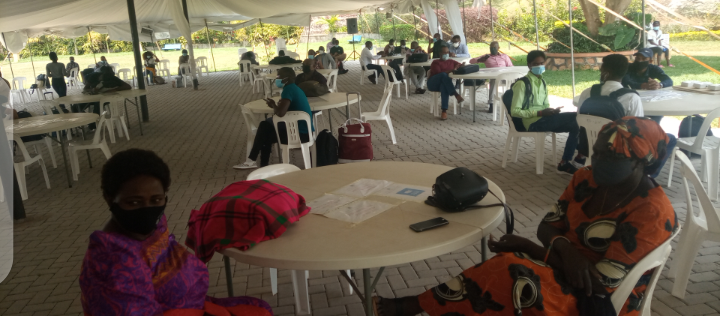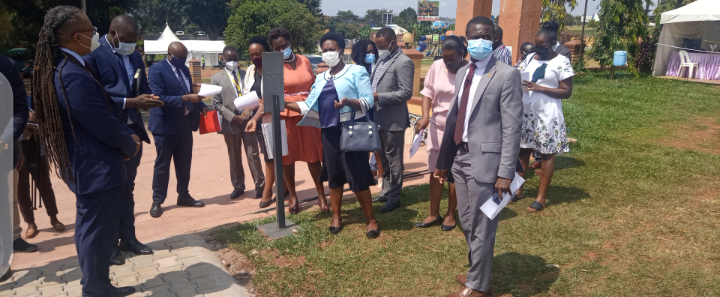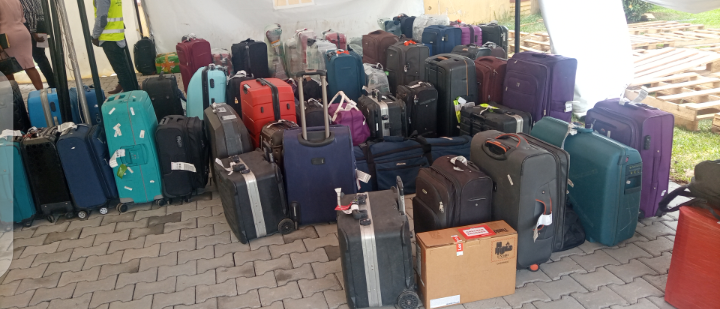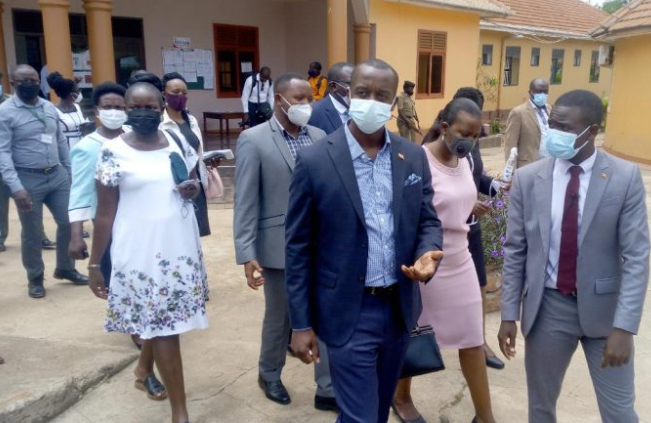The Health Committee of Parliament has been thrilled by the preparedness of the Entebbe testing facilities for the mandatory PCR testing of all incoming travellers.
In a bid to reduce on the increasing importation of deadly variants of the coronavirus, government at the start of this month, directed that all individuals entering into the country are subjected to a mandatory COVID test upon arrival regardless of their vaccination status.
The decision was based on available evidence shows that, vaccinated persons are protected from severe forms of the disease but can carry and spread the Virus yet category testing at the airport which was previously done had challenges of screening and can potentially allow variants of concern to enter the country.
The compulsory COVID testing was expected to start last week on September 3 but an inter-ministerial committee convened by the Prime Minister, Robinah Nabbanja, suspended its implementation for two weeks citing unpreparedness.
The testing facilities are located at Penial Beach, found a few meters from Entebbe International Airport. SoftPower News’ reporter, Kungu Al-mahadi Adam traveled with the Parliament’s Health Committee members led by its Chairperson, Dr Charles Ayume to the testing facilities for a fact-finding mission.
It has been established that there are six laboratories at the facility contrary to a single laboratory as reported in some sections of the media. They are Medipal Hospital Diagen, Case Hospital Diagen, Test and Fly, Gene Xpert and life river, City Medicals Diagen and Easynat, Same Day Laboratories Diagnovital and Safari Laboratories Diagnovital.
The laboratories have modern equipment set up at the site. The total testing capacity for the six private laboratories is 1048/run or per every 90 minutes.
All the six laboratories have capacity to produce PCR results within 90 minutes, something that has been verified by the Ministry of Health Laboratory supervision team.
The laboratories also have the capacity to serve the anticipated increase in the daily load of tests from the average of 120 travelers per day to the average of 800 travelers per day.
Travellers pay USD 65 for the PCR test at the facility and get results in a period not more than four hours.
Speaking to reporters at Penial Beach, Dr Charles Ayume said his committee was seeking to find out whether the facility was actually necessary and prepared for testing all incoming travellers, a question to which he answered to the affirmative.
“The facility is necessary in a sense that we anticipate a third wave as a country and monitoring points of entry is one of the pillars of WHO in management of epidemics. So, Ministry of Health is exercising its mandate in that regard,” Ayume said.
“We also appreciate the fact that it is private sector-led intervention with supervision of Ministry of Health. This site was identified by a joint team with included Ministry of Health and WHO as a testing site. What MoH does is quality assurance, supervision, data management, etcetera. There are six laboratories testing here under the watch of Uganda Virus Institute central public laboratories,” Dr Ayume noted.
On the public concerns regarding the cost and whether people who are vaccinated from their respective countries and those who had PCR test in the last 72 hours needed to be subjected to a test, Dr Ayume said it is better paying the USD 65 dollars for testing on entry than infecting many other people in the community.
“Yes, science has shown that even when you are vaccinated, you can still be a transmitter of some of these new variants like the delta. We have seen the statistics at this facility that 54% of the Delta Variant tested in Uganda, were from tourists – the question is, if the Ministry allows those people to go through, I think you can extrapolate,” Dr Ayume said.
“We are having probably 1300 passengers and if we open up, the numbers could go up but this facility has capacity for about 25,000 passengers and in the lady 120 days, of the 18000 that have been tested, 4% were positive, those are about 700 positives”
“As a Committee, we will support the position of the Ministry of Health to ensure that all passengers are tested regardless of their vaccination status or when they last did their PCR because we are backed by science,” he added.
The Committee Chairperson noted that the cost of treating a patient in ICU, is Shs 3 million per day, “let us have that at the back of our minds before we look at the financial and social inconveniences. If you had a patient in ICU, for 20 days, that is about Shs 60 million and yet someone could have paid USD 65 and walked through and doesn’t do a lot of community transmission.”
He said the Committee has already interfaced with the participating laboratories on a few areas to improve including reducing on the turnaround time of getting results from the four hours to at least two hours.
According to arrangement, all arriving passengers are escorted to the VIP Parking Lot by a joint Avipol, MoH & Operations team. At the parking lot, they present their baggage to the baggage handling team.
Passengers are then directed to wait for buses – 10 stationed buses with 30 seat capacity with social distancing. Hand sanitization is done before embankment on buses, a free mask is given to those without, social distancing is observed while in transit to the testing site.
They are escorted to the testing site by security personnel and on arrival, they sit in well paved waiting area for travelers with capacity to hold 300 passengers with free wireless internet and 16 charging spots, and six electronic bug zappers for trapping and killing lake flies and mosquitoes at night.
The area is fitted with a public address system that helps during results dispatch to the clients.
Travellers are able to access foods and drinks at their cost from external service providers.
Meanwhile, friends and family of travellers wait outside the gazetted testing area with ample packing for about 200 vehicles at a cost charged according to time spent.
The crowd is managed by the security personnel that are deployed at the testing ground. Upon receiving the results, the security team authorizes the traveler to leave the testing ground and link up with family.
Case for Tourists
Samples are collected from the testing grounds where a special desk has been setup to handle tourists. The tourists are allowed to move to five Hotels in Entebbe gazetted with the support of the Uganda Tourism Board (UTB).
The Hotels include Hotel Number 5, Papyrus Guest House, Boma Guest House, Karibu Guest House and Airport guest House hotel. The cost of staying at the guest house is settled by the tourists.
The results for Tourists will be processed within 2 hrs. The negative Tourists proceed to their destinations and positive ones are Isolated at gazetted NTIF.
What happens to other travellers who test positive?
All the identified positive cases are linked to Isolation facilities. The public Isolation facility will be Namboole Isolation facility.
Management of the facility says, two other non-traditional Isolation facilities have been identified for positive travelers who are not comfortable in Public isolation facilities – one in Entebbe (Mowcribs Hotel) to Isolate Tourists and other travelers and the second is in Kampala (Kerona Dam Hotel). The cost of the private facilities range from $60 to $80 full board.
The positive cases are managed by the case management pillar as per the National Protocols. Stand by transport is available for timely referral and linkage of positives cases to isolation facilities.
Positive samples are segregated and those with low CT value are forwarded to UVRI for Genomic sequencing.
A team of ten psychosocial counsellors are available at the testing site and airport to deliver results and also explain the importance of the intervention.













